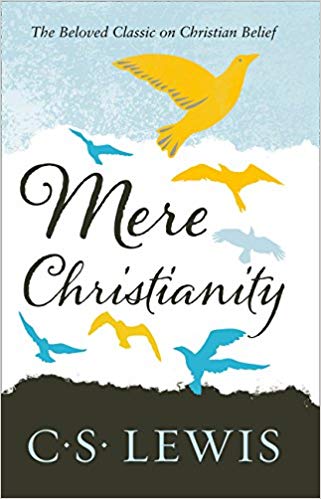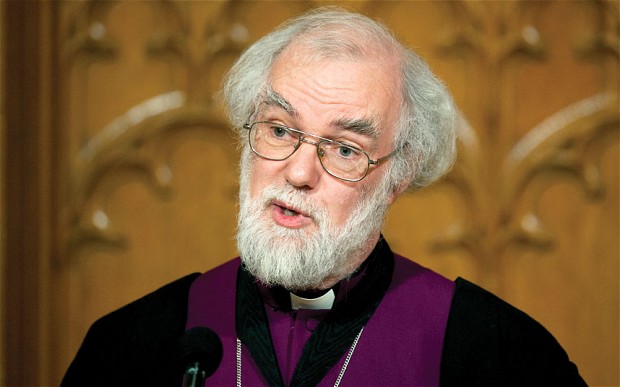
I was born and raised in the People’s Republic of Northern Britain by parents who are both godless communists. Now, they admit the atheism but don’t call themselves communists despite espousing nothing but communist views and always voting for the KGB-approved candidate in every election. My school was equally godless, with our Religious Education classes mostly composed of sitting around colouring in Bible scenes with coloured pens. So, it’s fair to say I was not inculcated with Christianity. Quite the reverse [1].
This means I never developed a feeling of godliness. It made it easy to absorb the atheist teachings of my (mostly Leftist) university professors. I read up on the standard anti-Christian Enlightenment arguments such as the Problem of Evil, Bertrand Russell’s Why I Am Not A Christian and all the various critiques of the standard pro-God arguments (First Cause, Argument By Design etc). I even thought I was an awfully smart boy by mastering these heresies. You see, atheism in the 1990s was presented as if it’s some kind of rebellion against the Establishment. People like Richard Dawkins were awfully brave.
How ridiculous. It’s like praising people in 2018 USA for “standing up” against Slavery. Because that’s such a dangerous position to take, isn’t it? I mean, look at all those Pro-Slavery death squads going around killing abolitionists nowadays. Anyway, the mask has been dropped and in 2018 atheism is the openly-avowed Establishment position. Christianity is under attack, and Christians are now the most persecuted group in the whole world.

A terrifying tyrant, yesterday
Having followed atheism for a few decades and lived a highly individualist and pleasure-seeking life I became aware of what Christian moral philosophers have warned for hundreds of years: atheism is a dead end. It ends in nihilism. I experienced such nihilism in 2016 and by 2017 I was looking for a better way. So far there’s only been one barrier to my converting to Christianity: my lack of belief in God. Aside from that small obstacle, I agree with the thesis that Christianity is one of the three pillars of Western Civilisation (white nations and the Greco-Roman legacy being the other two) and by removing Christianity from the West we have set ourselves into a rapid decline into nihilism and paganism. It’s a shit show.
Anyway, I give this preamble to explain why I decided to read Mere Christianity. I realised that every single time that I am an expert on a topic and I compare my knowledge to the media’s, I realise the media isn’t simply wrong. They are deceitfully wrong. They are deliberately hiding the truth in order to advance a false narrative. Whether the topic is global finance, mixed martial arts, Game, or anything else the lesson is the same: the media are liars. So, knowing that the media is virulently anti-Christian, I asked myself the obvious question:
The chances aren’t high, are they? I don’t mean that the media is atheist and therefore do they support Christianity, but rather can they be trusted to speak accurately of what Christianity actually is, of what Christians actually believe? I decided: probably not. So, I wanted to know what Christians believe. What are the central tenets of Christianity? I’ve heard what all the godless anti-Christian philosophers and media hacks (Dawkins being one of the latter) had to say, but how about the other side.

I’d like to hear from the people who built civilisation, not those who tore it down
In Mere Christianity, C.S.Lewis sets himself the task of explaining to the layman what all Christians believe. He deliberately excludes doctrinal disputes between denominations (e.g. what Protestants and Catholics disagree on) and sticks to what all share in common. It was highly enlightening. Here were some of my main learning points:
- Most of what I learned at school was either wrong or superficially true.
- Most of the anti-Christian arguments from the Enlightenment only work against the straw man they construct rather than real Christianity.
- Most churches, including the Vatican and the Church Of England, are run by Satanists.
- I agree with almost everything espoused by Christianity (aside from my lack of spiritual belief).
I’ll take the example of the Problem Of Evil. As usually formed, it takes the following logical structure:
Phrased that way it seems like a rather devastating proof against the existence of God, does it not? God is – tautologically – either too dumb, too weak, or too feckless to be worthy of worship. But the problem is, that’s a highly dishonest argument. The Bible doesn’t claim God is thus.
Mere Christianity says the Bible is clear that the world is fallen and is the dominion of Satan, the “Prince of this world”. God is not at all concerned with eliminating evil and making our worldly lives pleasant. He is in the business of saving individual souls, through the following of Jesus. It’s a tough narrow path to salvation, resolved on an individual level. There is no logical inconsistency at all between the God of the Bible, salvation, and the existence of Evil.
I’m rather annoyed that I had to wait until I was 43 years old before learning that. I feel like I’ve been seriously lied to. It would’ve been nice if all those Philosophy Of Religion courses had laid out the arguments and let me make my own mind up [2].
It’s usual for atheists to have sneering contempt for Christians [3] by talking of God as the “big spaghetti monster in the sky” or making comparisons to Santa Claus and the Easter Bunny. Christopher Hitchens aside, they seem to avoid saying such things to Muslims of course [4], which exposes both their cowardice and uneven-handedness. From reading Mere Christianity I came away with quite the reverse of contempt. C.S.Lewis lays out a balanced, sophisticated and tightly-reasoned case not just for Christian virtues but even for logical arguments in favour of belief in God.
That surprised me. The atheists have long since imposed the frame that their side is “reason” and the Christian side is “faith”. This frame has held for decades, such that I’d never even heard a Christian make a logical case for theism [5] and it surprised me when C.S.Lewis made such a powerful one.
There’s only one hour until the New Year is rung in and my 2018 reading / reviewing project comes to a close. I simply can’t give Mere Christianity the attention it deserves right now. It took me several days to read and I’ve never thought as deeply as when reading it. This is a book which fairly rattled some of my foundational assumptions and settled conclusions on the religious question. It gave me a radically different view of what Christianity is, and why it’s so important to the West.
I dare say I now wish I believed in God. Maybe that’ll come. But till then, I certainly believe in Evil and the need to fight it. Starting with the globalists and their Tower Of Babel.
If I do make a conversion to Christianity, I’ll be withdrawing my key pick-up products from the market, so if you want Daygame Mastery, Daygame Infinite and Daygame Overkill, 2019 is the time to buy them. Check them out here.


[1] Mind you, my nephews are being inculcated with Islam and homosexuality at their school, so things evidently got even worse.
[2] Though being a stupid teenager, I’d have probably ignored them anyway. I was too busy trying to be clever.
[3] While simultaneously projecting such contempt onto Christians.
[4] Maybe because Mohammad was a paedophile and the Left is pro-pedo.
[5] Admittedly it could be that they do frequently and I simply didn’t know. Perhaps I should get out more.